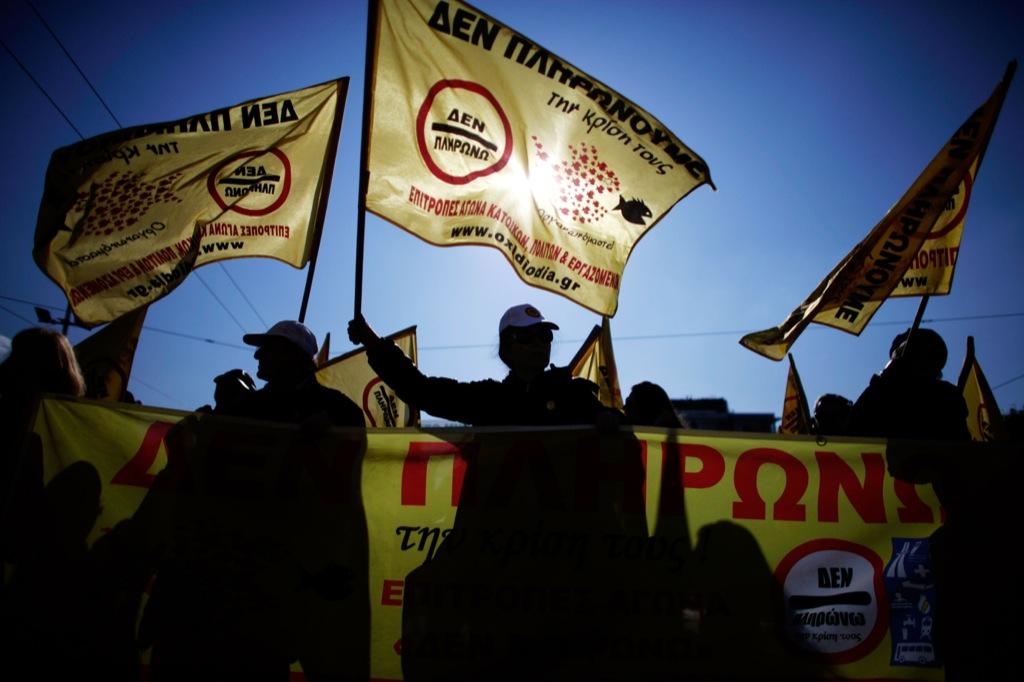Greece and creditors inch toward debt deal
Members of the ‘I wont pay’ movement wave flags and banners in front the Parliament building during a rally to protest against austerity in Athens, Jan. 17, 2012. Workers marched on parliament in their thousands protesting against austerity cuts as lenders from both the International Monetary Fund and European Union arrived in the capital for talks focusing on Greece’s economic reform program and the management of loans that have been provided to the country.
BERLIN, Germany — Greece is having a busy week — again.
Not only is it in the midst of tense negotiations with private creditors to secure debt relief and stave off default, but the bailout troika are back in town to look over the books and make sure Athens is implementing the prescribed austerity measures.
Talks between Athens and its private creditors — mostly banks and hedge funds — had broken down last Friday, but the lines of communication reopened late Wednesday and negotiations are continuing. If a deal is reached, it would see 100 billion euros ($129 billion) slashed off Greece’s crippling 350 billion euro debt burden.
More on GlobalPost: Greek debt talks halted for 'reflection'
Europe waits with bated breath, hoping that an agreement can be thrashed out which would see creditors take a significant haircut on the Greek debt they hold, so that the country can secure the next round of funding from its EU partners.
The deal currently being hammered eliminate a percentage of the creditors’ principal in exchange for new 30-year bonds. The talks broke down last week over the interest rate on those new bonds.
The negotiators from the Institute of International Finance (IIF), lead by Charles Dallara and Jean Lemierre, had been pushing for an interest rate of 4 to 5 percent, while Greece had wanted one well below 4 percent.
Reports on Friday said the two sides were inching towards a compromise deal, with an initial interest rate averaging 4 percent and rising every two years until 2020.
The deal would see bondholders incurring losses of between 65 and 70 percent, Reuters reports.
More on GlobalPost: Merkel warns Greece on second bailout
The pressure is on Greece to come up with a deal rapidly, so that it can get the next tranche of the bailout funds from the troika of the EU, IMF and ECB. Failing to do so would mean default, as Athens does not have the funds necessary to cover the next bond repayment of 14.5 billion euros in March. That is something that could trigger a meltdown within the euro-zone, and even push the global economy into recession.
The troika extended a 110 billion euro lifeline to Greece in May 2010, but the country has since required more help to ward off bankruptcy.
More on GlobalPost: IMF aims to raise up to $600 billion in new funds
While the talks with the IIF were continuing on Friday, Finance Minister Evangelos Venizelos also met with troika officials, who are in town to look at the Greek public finances to make sure that Athens is sticking to the tough austerity measures, which are a condition of the bailouts.
Officials will discuss with Greece how to implement structural reforms to boost the economy and how to cut the deficit over the coming years.
The austerity measures are deeply unpopular in Greece, where businesses are failing and unemployment levels are soaring as the economy contracts.
More on GlobalPost: Greece warns it could exit the euro
The story you just read is accessible and free to all because thousands of listeners and readers contribute to our nonprofit newsroom. We go deep to bring you the human-centered international reporting that you know you can trust. To do this work and to do it well, we rely on the support of our listeners. If you appreciated our coverage this year, if there was a story that made you pause or a song that moved you, would you consider making a gift to sustain our work through 2024 and beyond?
